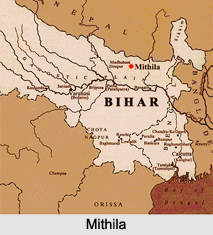 Mithila was capital of Videha kingdom in ancient Nepal as per epic Ramayana. It is situated between foothills of Himalayas and River Ganga. The ancient region of Mithila is today split into adjacent part of 2 countries - Bihar, state of India and Nepal.
Mithila was capital of Videha kingdom in ancient Nepal as per epic Ramayana. It is situated between foothills of Himalayas and River Ganga. The ancient region of Mithila is today split into adjacent part of 2 countries - Bihar, state of India and Nepal.
The most important reference to Mithila is in the Hindu epic, Ramayana where Lord Rama"s wife Sita is said to have been the princess of the land, born to King Janaka, who ruled Mithila from Janakpur.
History of the Kings of Mithila
The legend of Mithila extends over many centuries. The name "Mithila" is derived after Mythical King Mithi. He was supposed to have been created from body of his father King Nimi. He established the capital of his kingdom at Mithilapuri and hence the region came to be called "Mithila". The region was originally known as Videha. Since he was born out of body of his father, he took the title "Janak". After this, the Kings of Mithila were called "Janak". This dynasty was also called "Videh Janaks". There were 57 kings in the dynasty of Videh Janak.
Kings of Mithila
The first mythical King of this region was Nimi. As per the mythological tales, Nimi died due to curse placed on him by his Guru - Sage Vashista. The name Mithila is derived after this King.
The lineage of Janaks is mentioned in "Ramayana". The list of Janaks who ruled Mithila as per Ramayana is as follows:
•Nimi
•Mithi
•Udavasu
•Nandivardhana
•Suketu
•Devavrata
•Brihadvrata
•Mahaviry
•Sudhriti
•Dristaketu
•Haryasva
•Maru
•Pratibandhaka
•Kritiratha
•Devamidha
•Vibhuta
•Mahidhrata
•Kirtirata
•Mahorama
•Swarnorama
•Hrisvaroma
•Seeradhwaja Janaka
•Bhaanumaan /Bhanumath
•Shatadyumn /Satghumanya
•Shuchi
•Urjnama
•Kriti
•Anjan
•Kurujit
•Arishtnemi / Arisnami
•Shrutaayu /Srutayu
•Supaarshwa / Supasyu
•Srinjay
•Kshemaavee / Sourmani
•Anenaa
•Bhaumarath / Bhimrath
•Satyarath
•Upagu / Upangu
•Upagupt
•Swaagat
•Swaanand /Snanand
•Suvarchaa /Subrachya
•Supaarshwa /Supraswa
•Subhaash
•Sushruta
•Jaya
•Vijay
•Rit
•Sunay
•Veetahavya /Vith Habya
•Dhriti / Dwati
•Bahulaswa
•Kriti
Mithila after Janaks
It is said that the last King of Janak Dynasty - Kirti Janak was an atrocious ruler who lost control over his subjects. He was dethroned by public under leadership of Acharyas. Thereafter, Mithila remained without King for hundreds of years. Instead of King, a democratic system was followed where the ruler was elected by the people and the decisions were taken in a collective manner.









